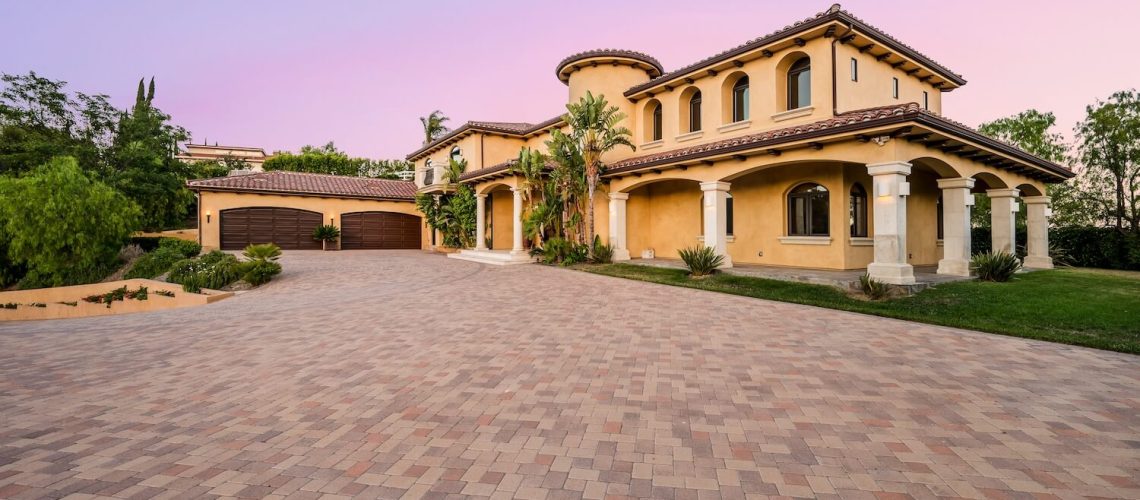A driveway is more than just a path that leads to your home—it is one of the first features that visitors notice and a crucial part of your property’s curb appeal. Among the many options for driveway materials, pavers stand out for their unique blend of style, functionality, and longevity. If you’re considering upgrading or installing a new driveway, paver driveways offer a practical and aesthetically pleasing solution that can enhance the look and value of your home.
In this article, we’ll explore the key benefits of paver driveways, including their style versatility, functionality in different weather conditions, and their impressive durability. By the end, you’ll understand why pavers have become a popular choice for homeowners seeking a long-lasting and attractive driveway option.
1. Aesthetic Versatility and Design Options
One of the most significant advantages of a paver driveway is the virtually limitless design options available. Unlike plain concrete or asphalt driveways, pavers come in a wide range of colors, shapes, textures, and patterns, allowing homeowners to create a customized look that complements the architectural style of their home.
Custom Patterns and Layouts
Paver driveways allow you to get creative with your design. Whether you prefer a classic herringbone pattern, an elegant basket weave, or a more contemporary running bond design, pavers can be arranged in a variety of ways to achieve the desired aesthetic. You can also mix and match paver sizes and colors to create borders, focal points, or intricate designs that make your driveway truly unique.
Color Choices
With pavers, you’re not limited to dull grays and blacks. Pavers come in an array of natural tones, such as earthy browns, warm terracottas, slate blues, and even greens. This wide selection of colors means you can choose pavers that enhance the exterior color scheme of your home, from matching the roofline to complementing your landscaping.
Natural Stone and Concrete Alternatives
For those who love the look of natural stone, there are paver options that mimic high-end materials like cobblestone, flagstone, or travertine at a more affordable price. If you prefer the sleek, modern look of concrete, you can opt for concrete pavers in smooth finishes or with textured surfaces for added visual interest.
2. Durability and Strength
When it comes to functionality, durability is where paver driveways truly shine. Unlike other materials like asphalt, which can crack and deteriorate over time, pavers are designed to handle heavy loads, fluctuating temperatures, and frequent use.
High Load-Bearing Capacity
Pavers are incredibly strong, making them ideal for driveways that must support the weight of vehicles, trucks, and heavy loads. This is especially important for larger households or properties that receive frequent traffic. Interlocking pavers, in particular, distribute weight evenly across the surface, reducing the risk of cracking or sinking.
Flexibility and Movement
One of the unique benefits of pavers is their flexibility. Since pavers are individual units placed together, they can move slightly with the ground as it expands and contracts during freezing and thawing cycles. This flexibility helps prevent the cracking and damage that often occur with solid materials like concrete. In areas with significant temperature changes, this movement capability is essential for a long-lasting driveway.
Resistance to Weather and Elements
Paver driveways are highly resistant to harsh weather conditions, including heavy rainfall, snow, and ice. Their durability extends to resisting erosion, cracking from extreme heat, and damage from freezing temperatures. The surface of pavers is also naturally slip-resistant, making them a safe choice for walkways and driveways, especially in regions that experience wet or icy conditions.
Longevity with Minimal Maintenance
While other materials like asphalt or concrete may need resurfacing or resealing over time, pavers offer long-lasting performance with minimal maintenance. Paver driveways can last for decades, often 30-50 years, depending on the material and quality of installation. Routine care, such as sweeping and occasional pressure washing, is typically all that’s needed to keep the driveway looking pristine. Should individual pavers become damaged, they can be easily replaced without disrupting the entire driveway, making paver driveways both low-maintenance and cost-effective in the long run.
3. Easy Repairs and Maintenance
In addition to their impressive durability, paver driveways are remarkably easy to maintain and repair. This makes them an excellent choice for homeowners who want a long-lasting driveway without the hassle of frequent upkeep.
Easy Replacement of Individual Pavers
If a paver gets chipped, stained, or otherwise damaged, there’s no need to replace the entire driveway or deal with patching like you would with concrete or asphalt. Instead, you can remove and replace the damaged paver without affecting the surrounding area. This is not only cost-effective but also ensures that the appearance of the driveway remains seamless.
Preventing Weeds and Pests
To minimize weed growth between pavers, many homeowners opt for polymeric sand, which hardens in the joints and prevents plants from sprouting. Polymeric sand also acts as a barrier against insects and pests that might otherwise try to burrow between the pavers. This small addition can keep your driveway looking tidy and reduce the time you spend on maintenance.
Stain Resistance
Most pavers are treated with a sealant that makes them resistant to staining from oil, gasoline, and other substances that might spill on your driveway. Sealing your paver driveway periodically helps protect it from stains and weather damage, preserving its appearance over time. In the case of a spill, pavers are easier to clean than asphalt or concrete, as the sealant prevents the substance from penetrating the surface.
4. Eco-Friendly and Sustainable
For environmentally conscious homeowners, paver driveways offer several green benefits. Unlike solid surfaces like asphalt, pavers are a more eco-friendly option due to their permeability and material composition.
Permeable Paver Systems
Permeable pavers allow water to pass through the gaps between each unit, reducing runoff and promoting the absorption of rainwater into the ground. This is especially important in urban areas where excess runoff can lead to flooding and erosion. By allowing water to percolate through the surface, permeable pavers help recharge groundwater supplies and reduce the strain on local stormwater management systems.
Natural and Recyclable Materials
Many pavers are made from natural materials, such as clay or stone, or from concrete, which is fully recyclable. When it comes time to replace or remove your paver driveway, the materials can be recycled or reused in other projects, reducing waste and the environmental impact of your home improvement.
5. Boosting Curb Appeal and Property Value
A paver driveway not only enhances the appearance of your home but also increases its resale value. A well-designed and properly installed paver driveway creates an inviting first impression, boosting curb appeal for prospective buyers and neighbors alike.
Aesthetic Appeal
The visual appeal of pavers sets your home apart from others with standard asphalt or concrete driveways. The natural beauty of the pavers and the ability to customize patterns and colors make your driveway a statement piece that complements the overall landscape. Whether you’re looking for a modern, rustic, or traditional aesthetic, pavers can be tailored to meet your design goals.
Increasing Home Value
Investing in a paver driveway can pay off when it comes time to sell your home. Not only does a paver driveway enhance curb appeal, but its durability and low-maintenance nature are attractive selling points for potential buyers. A high-quality paver driveway can increase your property’s value by adding a long-lasting feature that enhances the overall look and function of the home.
6. Cost Considerations and Long-Term Savings
While paver driveways typically have a higher upfront cost compared to asphalt or concrete driveways, they offer significant savings over time due to their longevity, low maintenance, and ease of repairs.
Initial Investment vs. Long-Term Value
The initial cost of installing a paver driveway may be higher than other options, but it’s important to consider the long-term value. Unlike asphalt or concrete, which may require resurfacing, sealing, or even full replacement every few years, a paver driveway can last for decades with minimal maintenance. When you factor in the potential repair costs and maintenance required for other materials, pavers often prove to be the more cost-effective choice in the long run.
Professional Installation for Lasting Results
To fully reap the benefits of a paver driveway, professional installation is crucial. A qualified contractor will ensure that the base is properly prepared and that the pavers are laid with precision, preventing future problems like uneven settling or drainage issues. While DIY installation may be tempting to save money, hiring professionals guarantees that your driveway will look and perform its best for years to come.
Paver Driveway Advantages Conclusion
Paver driveways offer an unbeatable combination of style, functionality, and longevity that makes them a top choice for homeowners looking to enhance their property. With endless design possibilities, exceptional durability, and low maintenance requirements, paver driveways are both a practical and aesthetically pleasing investment. Though they may require a higher initial cost, their long-term savings, ease of repair, and eco-friendly benefits make them a worthwhile addition to any home.

